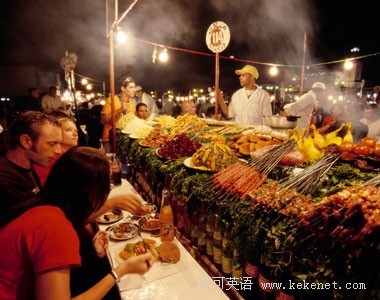Is street food inherently more risky than eating in a restaurant when you travel? Sometimes, and it depends. Children, the elderly, and those with compromised immune systems are certainly more at risk of getting ill, and may be best off avoiding street eats. But there are certain precautionary measures healthy travelers can take before scarfing their tacos or mystery-meat kebabs that will minimize the chances of bringing home more than just a suitcase full of sweatshop-made tchotchkes as souvenirs. Read on.
ж—…жёёж—¶еңЁиЎ—еӨҙз”ЁйӨҗжҳҜдёҚжҳҜжҜ”еңЁйӨҗйҰҶз”ЁйӨҗзҡ„йЈҺйҷ©жӣҙеӨ§е‘ўпјҹжҹҗдәӣж—¶еҖҷпјҢжҳҜзҡ„гҖӮеҰӮе„ҝз«ҘгҖҒиҖҒдәәе’Ңе…Қз–«зі»з»ҹеҸ—жҚҹзҡ„дәәжӮЈз—…йЈҺйҷ©жӣҙй«ҳпјҢж•…еә”йҒҝе…ҚиЎ—еӨҙйЈҹе“ҒгҖӮдҪҶж—…е®ўеңЁйЈҹз”ЁзҺүзұійҘјжҲ–зү№еҲ¶зғӨзҫҠиӮүдёІеүҚд№ҹеҸҜд»ҘйҮҮеҸ–дёҖдәӣеҒҘеә·зҡ„йў„йҳІжҺӘж–ҪпјҢиҝҷе°ұйҒҝе…ҚдәҶеёҰеӣһ家зҡ„еҸӘжҳҜж»Ўз®ұеӯҗиЎҖжұ—е·ҘеҺӮеҲ¶йҖ зҡ„е°ҸзәӘеҝөе“ҒгҖӮиҜ·зңӢд»ҘдёӢж–№жі•гҖӮ
1. Is there a crowd? Just like at home, go where the locals go, as they obviously know where to find the good stuff. But high volume also means that food is being prepared fresh, rather than sitting around attracting flies and turning into something useful for waging biological warfare.
1гҖҒжҳҜеҗҰжӢҘжҢӨпјҹе°ұеғҸеңЁеӣҪеҶ…дёҖж ·пјҢи·ҹзқҖжң¬ең°дәәиө°пјҢеӣ дёә他们зҹҘйҒ“е“ӘйҮҢеҸҜд»ҘжүҫеҲ°еҘҪдёңиҘҝгҖӮдәәеӨҡеҗөжқӮзҡ„ең°ж–№ж„Ҹе‘ізқҖйӮЈйҮҢзҡ„йЈҹзү©жҳҜж–°йІңеҮҶеӨҮзҡ„пјҢиҖҢдёҚеғҸжңүдәӣйӨҗйҰҶйқҷеҫ—еҸӘжңүиӢҚиқҮеңЁйЈһпјҢд»ҺиҖҢеҸҳжҲҗз»ҶиҸҢжҲҳгҖӮ












